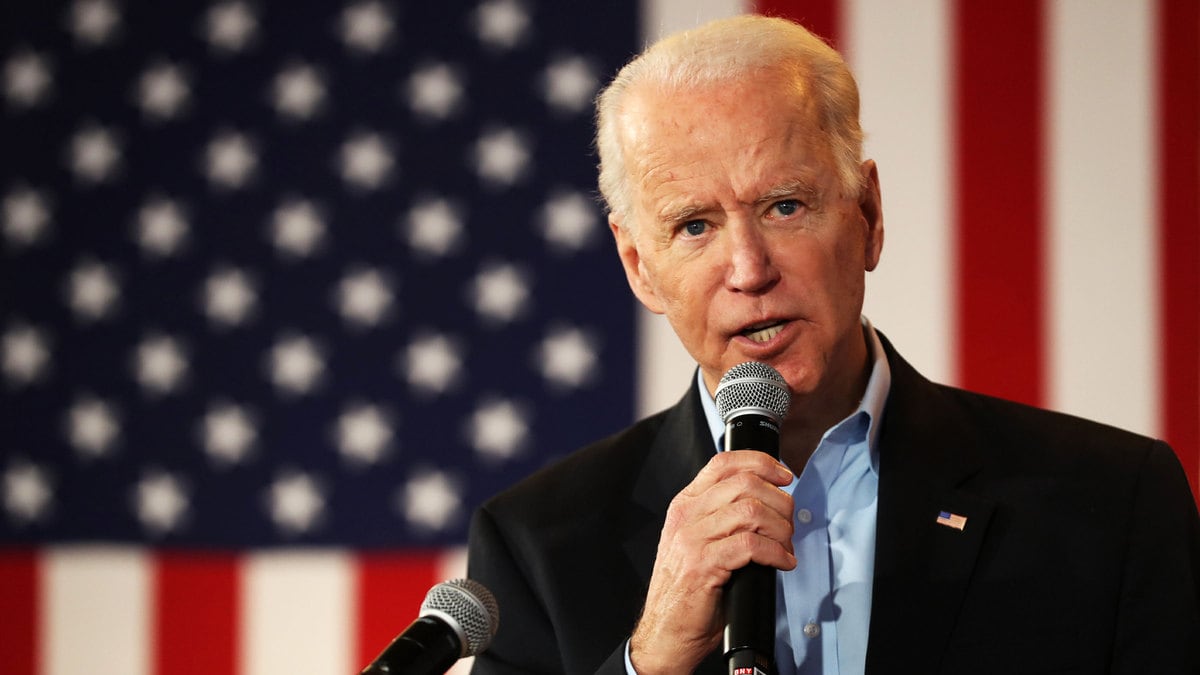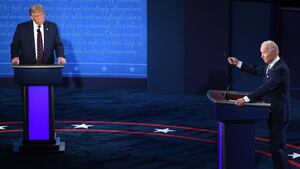In the midst of a pandemic that has killed more than 220,000 people in the United States, many Americans have shifted their focus away from another crisis that has claimed nearly exactly that many lives over the past three years: substance use and addiction.
Now, the Trump campaign’s continued attacks on Hunter Biden in the closing days of the presidential campaign—largely framed around his publicly documented struggles with addiction in the past—are adding to the frustrations of treatment experts already contending with a substance use epidemic exacerbated by the coronavirus. Some, however, are hopeful that the conversation about addiction could bring renewed focus to President Donald Trump and former Vice President Joe Biden’s proposals for addressing the country’s other public health disaster.
“We would hope that they recognize that until COVID arrived, the only national health crisis was around substance use disorders,” said Mark Dunn, director of public policy for the National Association of Addiction Treatment Providers. “The problems around mental health and substance use disorder have only been exacerbated due to COVID, and so when we come through this with a vaccine, or however we get through it, there are a lot of people that are going to need a lot of help.”
“There were a record number of drug overdose deaths in 2019 and we are on track to set another grim record in 2020,” said Marcia Lee Taylor, chief government relations officer with the Partnership to End Addiction. “Policy makers—regardless of party—are going to need to make addressing this crisis a top priority in 2021 and beyond.”
Even as the coronavirus pandemic has exacerbated the conditions—social, medical, economic—that can lead to substance use, addiction has almost exclusively been discussed in the largely disparaging context of Hunter Biden’s past struggles.
“Are you talking about Hunter?” Trump said during the first presidential debate in September, interrupting Biden as he reflected on his late son, Beau Biden, who died of brain cancer five years ago. “Hunter got thrown out of the military. He was thrown out, dishonorably discharged for cocaine use—he didn’t have a job until you became vice president, and once you became vice president, he made a fortune.”
Rudy Giuliani, the president’s attorney, has doubled down in recent weeks with the leaking of materials allegedly obtained from Hunter Biden’s laptop, using the as-yet-unproven existence of what he told The Daily Beast was “a number of photographs that show very explicit sexual activity, and other very personal things, and also display criminal conduct” including “smoking crack” to impugn the elder Biden as both a parent and a public servant.
Addiction treatment specialists have warned that the false attacks—Hunter Biden was not dishonorably discharged—stigmatize the tens of millions of Americans in recovery, and could make them less likely to seek treatment at a time when relapse rates are skyrocketing nationwide.
“The stigma surrounding mental health and addiction has been shown to be a significant barrier to treatment and prevents many people from seeking the help that they need,” Dr. Lawrence Weinstein, chief medical director of American Addiction Centers, said at the time, calling addiction “an indiscriminate, chronic, complex and relapsing brain disease.”
“This disease is not the result of a moral failing, poor judgment, or weakness—it is a chronic condition that requires lifelong maintenance,” Weinstein said.
There are links between both Trump’s condemnatory rhetoric on addiction and Biden’s more humane public statements, telling Trump that he was “proud” of his son for working to overcome his addiction, and their respective stances and policy proposals on substance use and the so-called “War on Drugs.”
In Biden’s “Plan to End the Opioid Crisis,” where the word “family” and its variants appear six times and is mentioned at least once in every section, the emphasis is on combating substance by expanding access to substance use disorder treatment and mental health services. The plan’s most detailed section pledges to make prevention, treatment and recovery services available to every American in need of them with the allocation of $125 billion in state funding for such services over the next decade, and vows to roll integration of substance use disorder care into his proposed public healthcare option.
Biden’s plan would also refocus fighting the flow of drugs from street-level dealers to large pharmaceutical companies and “bad actors” in countries like China and Mexico, with increased taxes on pharmaceutical companies to pay for treatment of the drug problem that their products have created, and threats of sanctions against illicit fentanyl producers in East Asia.
Biden’s proposals reflect a long history of advocating for more humane treatment of those struggling with addiction, dating back to his time in the Senate.
“He really, legitimately cares about this issue deep in his bones, so this is not something new—he’s not new to the scene on this issue,” Taylor, who worked on Biden’s Senate Judiciary staff for seven years as a senior drug policy adviser, told The Daily Beast in an interview following the first debate. “He’s cared about it for years and years and really feels the pain of families who are going through this—not just because it's touched his family but because he has seen the effect it has on families across the country and really cares about it.”
In particular, the inclusion of substance use disorder treatment in health coverage, which Biden pushed for during the drafting of the Affordable Care Act, is lauded by care providers as a major boon, extending what is often a prohibitively expensive treatment to those in the least position to pay for it.
While Trump’s campaign has eschewed the standard campaign practice of making specific policy proposals for his next term, instead championing “Promises Kept” by his administration, the president does address a subsection of the page dedicated to social programs to the fight against opioids. The section highlights that the Trump administration allocated nearly $500 million to states for preventing and treating opioid use—dubbed “abuse,” a term treatment providers discourage as demeaning—and points to several legal crackdowns on possession of fentanyl and overprescription of unnecessary opioids.
Not included in the list are the Trump administration’s request for $1.5 billion in federal funding for State Opioid Response grants in its most recent budget, which are aimed at funding prevention, treatment and recovery services, and includes a 15 percent “set-aside” for the ten states with the highest mortality rates from drug overdoses.
“Addiction to alcohol, illicit drugs, and prescription medications fuels havoc, heartache, and hopelessness in the lives of far too many Americans, as well as their friends and family members,” Trump said in a proclamation declaring October to be National Substance Abuse Prevention Month—one of many recent occasions when the president has mentioned the toll that the pandemic has exacted on those with substance use disorders, in part to justify his lax approach to social distancing and mask requirements. “We renew our unyielding commitment to breaking the grip of alcohol and drug addiction. Through our continued national effort, we will save lives and work to ensure a stronger and healthier country.
But Trump’s “unyielding” public and political fixation on a punitive response to addiction—the Office of National Drug Control Policy has in recent years increasingly focused on interdiction and law enforcement as opposed to prevention, treatment and recovery, when it has been focused on anything—is an old-school approach that treatment experts warn can put addicts in prisons instead of treatment.
One notable example is the president’s long-promised but never materialized campaign pledge to extend the death penalty to drug dealers, which has made treatment providers concerned that Trump only thinks of drug use in terms of punishment, rather than recovery.
“The problem with that approach is that many people who become addicted obviously find themselves in financial difficulties, and turn to selling drugs as a means of funding their habit and in their life,” said Dunn. “It’s hard to distinguish someone who is this supposed drug kingpin as opposed to some college kid who’s become addicted and has resorted to selling to just to maintain his livelihood.”
The stresses of the pandemic, as well as the increased isolation and economic catastrophe it has wrought, have made the issue of conscientious treatment more important than ever. Asked what they would hope to see under a second Trump administration—or under a first Biden term—treatment experts told The Daily Beast that their laundry lists would include implementation of sentencing parity laws, expansion of evidence-based prevention programs in schools and eliminating barriers to housing, education, employment and public benefits that often prevent recovering addicts from reintegrating into society.
“The good news is that there is great, bipartisan consensus on what needs to be done,” said Taylor. “Both the Surgeon General’s report on Facing Addiction, released at the end of the Obama administration, and the Christie Commission report, released by the Trump administration, focused on many of the same key points. What we haven’t yet had is the political will to enact the necessary changes and spend what it will take to make a real impact.”
In the meantime, those working to fight the substance use crisis hope that Trump’s broadsides against individuals in recovery will cease so that Americans can focus on the crisis itself.
“We would hope that whoever ends up being the next president would reduce the stigma attached to addiction,” said Dunn. “We would hope that they understand the disease concept, and focus on prevention-treatment-recovery, as opposed to punishment.”







